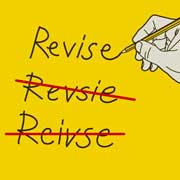
Why is it that at the end of the semester, everything always ends up due on the same day? My to-do list is more of a novel than a post-it, and it can be difficult to manage some semblance of balance in the last few weeks of the semester. Here are some things to try if, like me, you’re a little busy at the moment. I’ll try to keep it quick.
Get organized.
- Itemized To-Do Lists: I’m working, graduating, taking a full course load, applying for jobs, AND moving—all in the month of May. To stay on top of each deadline, I make separate to-do lists for each of these big-ticket items, and list each smaller step under the larger ones. Put them up somewhere where you’ll see them, like above your work space. This way you can keep track of every step you’ve taken toward your goal, rather than having the entire project hanging over your head. (Sometimes, I’ll put something I’ve already done on there, because it feels good to cross it off!)
- Example: Finish Class
- Weekly blackboard posts
- For 4/28
- For 5/1
- For 5/10
- Final Paper due 5/15
- Research topic
- Prospectus due on Blackboard 5/1
- Draft for peer review due 5/10
- Group?
- Peer review comments due 5/12
- Notes from peer review:
- Revise transitions
- Consider adding research on background
- Check APA
- Make appointment with writing studio?
- Turn in: 5/15
- On Blackboard too?
- Return books to library
- Notes from peer review:
- Weekly blackboard posts
- Example: Finish Class
- Post-It Method: Write each task on a post-it note, and stick them up somewhere you’ll see them often. Once a task is complete, recycle the post-it note. This works well for people who would rather see their list get smaller as tasks are completed, rather than seeing lots of crossed off items.

- Bullet Journal Method: If you’d rather your to-do list be portable, try keeping it in a journal. The Bullet Journal Method allows you to track larger tasks and schedule each step. It’s great if you’re balancing multiple deadlines with limited time. Best of all, you don’t need to buy a new planner, you just need a notebook of some kind. For information on how to set yours up, visit the website here.
- “GTD Method”: David Allen, author of Getting Things Done: the Art of Stress Free Productivity, explains his method for time management and task completion on his website and in his TEDtalk. Allen’s five steps to GTD are: 1) Capture 2) Clarify 3) Organize 4) Reflect 5) Engage.
- Syllabus: Revisit your syllabus, and cross of all the tasks that you’ve completed to get a full view of what you’ve done, and what you still need to do.
- Tech: There are tons of apps and websites that can help you organize your tasks and manage your time (I’m partial to Evernote). You can use what you already have, with your school Gmail Update the calendar with all your due dates, set reminders, and create a to-do list that you can access from your phone or computer.
Don’t add on.
- Table some things for later: Make a list of the things on your list that can be put off until after the semester is over. Do you really need to plan your vacation this week? Does your dog absolutely have to go to the vet on Thursday, or can you reschedule? What about that dinner party? Get your responsibilities down to a minimum so that when you do have the time to do them, you’ll actually enjoy it.
- Block out distractions: I downloaded an extension (WasteNoTime) to limit my time on various time-sucking websites to 10 minutes a day (including email!). You can also delete apps from your phone so that you don’t waste time scrolling mindlessly.
- Set realistic expectations: Let family and friends know that your next few weeks will be busy, so that there are no hurt feelings or unrealistic expectations of your time.
- Optimize your time: As soon as I need to write a big paper, my junk drawer suddenly looks like a very necessary thing to organize. Getting out of the house helps to minimize this kind of “productive procrastination.” Stake out a study room in the library, a booth in your local coffee shop, or anywhere else where you won’t be tempted to distract yourself with other tasks. In the same vein, find the best time of day for you to get things done and maximize it.
Embrace it.
- Make stress your friend: Hey! You have things to do. Isn’t that exciting? Not everyone gets to do this. Own it, enjoy it, let it propel you forward. Kelly McGonigal’s “How To Make Stress Your Friend” and Daniel Levitin’s “How To Stay Calm When You Know You’ll Be Stressed” are two great TEDtalks that can help you do this.
- Get into it! At the Graduate Writing Studio we know that hardest part is getting started, and once you do, you usually flow through the assignment. If you haven’t picked on up on my writing style yet… surprise! Here’s a TEDtalk to prove my point.
- Set a reward: You’ve been working hard, so don’t forget to reward yourself. Setting a big reward for finishing a task helps me stay focused and inspires me to keep trying. It can be big, like a weekend trip, or small, like treating yourself to your favorite bad-but-so-good drink at that coffee place that always has a line around the block (I’m looking at you, DutchBros).
Good luck! And, as always, the Graduate Writing Studio is here all week to help.
By: Tricia Savelli








 We all know the feeling of coming back to another semester of grad school. Intense lectures and seminars, long hours of studying and preparing for exams, meeting after meeting with professors and advisors, and of course hours upon hours of writing. Simply put, life as a graduate student can be extremely demanding and at times, very overwhelming. For the most part, no matter the program you may find yourself in, the truth is you will be required to do lots of writing and eventually write a thesis, dissertation, or project. As a second year graduate student, I would like to share several tips on how to start the semester off strong, successfully make it to finals week, and eventually graduation.
We all know the feeling of coming back to another semester of grad school. Intense lectures and seminars, long hours of studying and preparing for exams, meeting after meeting with professors and advisors, and of course hours upon hours of writing. Simply put, life as a graduate student can be extremely demanding and at times, very overwhelming. For the most part, no matter the program you may find yourself in, the truth is you will be required to do lots of writing and eventually write a thesis, dissertation, or project. As a second year graduate student, I would like to share several tips on how to start the semester off strong, successfully make it to finals week, and eventually graduation.


 Giving yourself time to refresh is crucial to your success. It serves as a way to reward yourself for your hard work during the week, and motivate as well, by giving you something to look forward to.
Giving yourself time to refresh is crucial to your success. It serves as a way to reward yourself for your hard work during the week, and motivate as well, by giving you something to look forward to.
 It is important to educate our students on how to identify plagiarism, how to avoid it, and how to cite correctly. In fact, our librarians at California State University Fresno’s Henry Madden Library, offer workshops on “Avoiding Plagiarism” and our Grammar for Grad Students Series has also included a session on plagiarism.
It is important to educate our students on how to identify plagiarism, how to avoid it, and how to cite correctly. In fact, our librarians at California State University Fresno’s Henry Madden Library, offer workshops on “Avoiding Plagiarism” and our Grammar for Grad Students Series has also included a session on plagiarism. the ideas embodied in the research and know how to cite appropriately. This requires much more than substituting a word here and there or re-ordering a sentence. If a student has taken the time to research and understand the topic, they will be able to communicate the issues embodied in the topic in their own words.
the ideas embodied in the research and know how to cite appropriately. This requires much more than substituting a word here and there or re-ordering a sentence. If a student has taken the time to research and understand the topic, they will be able to communicate the issues embodied in the topic in their own words.

 searching their biological instincts to find a way to survive the experience. They also trust that, if they fail, they will be saved. Throw the student in, but be there to save them from drowning. Grammar, logical continuity, syntax, research, outlining, the drafting process, and other processes have been a part of every graduate student’s life at some point—this is their pool of water. They may not have the vocabulary to explain these things and they may not know how to explain the functions of language on the page—they may not know that they already know how to swim—but they have been exposed enough to paddle their way to safety.
searching their biological instincts to find a way to survive the experience. They also trust that, if they fail, they will be saved. Throw the student in, but be there to save them from drowning. Grammar, logical continuity, syntax, research, outlining, the drafting process, and other processes have been a part of every graduate student’s life at some point—this is their pool of water. They may not have the vocabulary to explain these things and they may not know how to explain the functions of language on the page—they may not know that they already know how to swim—but they have been exposed enough to paddle their way to safety. Students often get caught up in sounding scholarly. When encountering this, try to ask them, “How would you write this sentence?” Often, after they have let go of that Jiminy Cricket on their shoulder who is telling them that they need to write to a scholarly audience, they dismantle the facade and rewrite the sentence in their own authoritative voice. These students haven’t quite learned that they have already become the scholars and they definitely do not trust themselves. How do we show them how to trust themselves? We ask them to explain the subject in their own words. We should listen, ask, and then listen again. They have the tools and a constructivist approach would assume that they would find their way. A consultant should say “there is the pool,” throw them, in and be the “life jacket” in case the student flounders. Nine times out of 10, the student will find their way toward a clear, scholarly, voice that belongs to them.
Students often get caught up in sounding scholarly. When encountering this, try to ask them, “How would you write this sentence?” Often, after they have let go of that Jiminy Cricket on their shoulder who is telling them that they need to write to a scholarly audience, they dismantle the facade and rewrite the sentence in their own authoritative voice. These students haven’t quite learned that they have already become the scholars and they definitely do not trust themselves. How do we show them how to trust themselves? We ask them to explain the subject in their own words. We should listen, ask, and then listen again. They have the tools and a constructivist approach would assume that they would find their way. A consultant should say “there is the pool,” throw them, in and be the “life jacket” in case the student flounders. Nine times out of 10, the student will find their way toward a clear, scholarly, voice that belongs to them. Academic conferences in your field of study are valuable (and often initially intimidating) scholarly experiences. Since I am preparing to attend a conference next month, I’ve compiled a series of tips for applying to, getting to, and presenting at graduate and undergraduate conferences.
Academic conferences in your field of study are valuable (and often initially intimidating) scholarly experiences. Since I am preparing to attend a conference next month, I’ve compiled a series of tips for applying to, getting to, and presenting at graduate and undergraduate conferences.

 Conference Etiquette
Conference Etiquette This week I am going to feature two of our amazing writing consultants and their thoughts on the best use of time and managing life during the writing process. We are losing Katy as she is moving on to a job in her field of study and expertise, but Scott will be back to discuss his ideas further in a continuing series. First up, Katy Hogue:
This week I am going to feature two of our amazing writing consultants and their thoughts on the best use of time and managing life during the writing process. We are losing Katy as she is moving on to a job in her field of study and expertise, but Scott will be back to discuss his ideas further in a continuing series. First up, Katy Hogue: 
 By Scott Trippel, Graduate Writing Consultant
By Scott Trippel, Graduate Writing Consultant spending 3 hours in the middle of the night, try sleeping, wake up refreshed, and get your paper done in 1 hour. I found a lot of advice about sleep hygiene online, one of the best comes from the University of Michigan Health System. You can find it here.
spending 3 hours in the middle of the night, try sleeping, wake up refreshed, and get your paper done in 1 hour. I found a lot of advice about sleep hygiene online, one of the best comes from the University of Michigan Health System. You can find it here.
 A great deal of students we see at the Graduate Writing Studio are completing degrees in psychology, nursing, and physical therapy. While health-centric disciplines may not be popularly associated with writing, the GWS can offer guidance on literature reviews, case reports, evidence-based papers, and any other written projects. In a 2013 evaluation of its own writing center, the Medical University of South Carolina found “that nearly all students who used the Center agreed (and most strongly agreed) that it met their needs” and use of the Center was “associated with a better written product” (Ariail et al. 132).
A great deal of students we see at the Graduate Writing Studio are completing degrees in psychology, nursing, and physical therapy. While health-centric disciplines may not be popularly associated with writing, the GWS can offer guidance on literature reviews, case reports, evidence-based papers, and any other written projects. In a 2013 evaluation of its own writing center, the Medical University of South Carolina found “that nearly all students who used the Center agreed (and most strongly agreed) that it met their needs” and use of the Center was “associated with a better written product” (Ariail et al. 132). The quiet is deafening. Students have gone home for the holiday break and the Graduate Writing Studio is, for the most part, empty. It is a time for reflection and looking toward next semester. Here are some things to look forward to:
The quiet is deafening. Students have gone home for the holiday break and the Graduate Writing Studio is, for the most part, empty. It is a time for reflection and looking toward next semester. Here are some things to look forward to:
